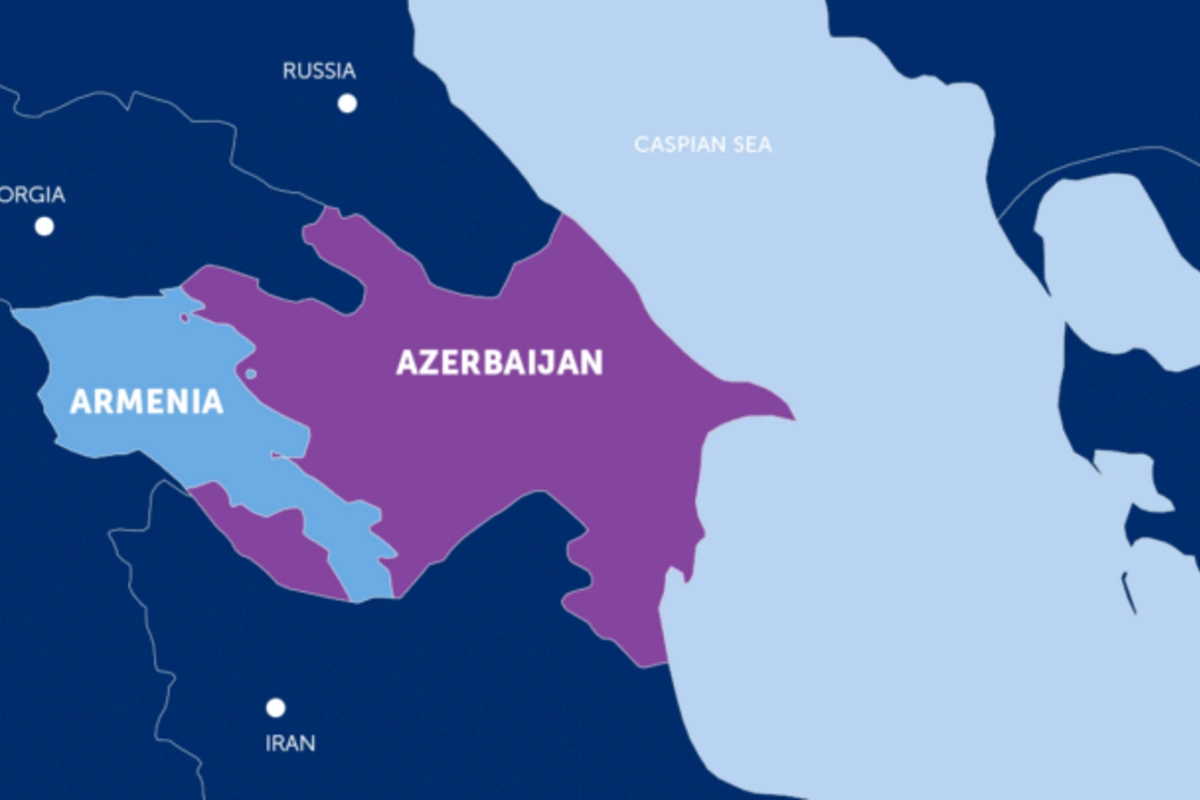
"The implementation of the Nakhchivan transport corridor remains critical. Agreements between Azerbaijan and Armenia on borders and mutual transportation links align with the interests of both nations, offering sustained economic benefits from transit revenues," the analyst stated.
Photo: Social meida
The Caspian Post presents an interview with Marat Musuraliev, a Kyrgyz economist and analyst, who shares his insights on the current geopolitical dynamics in the South Caucasus, the strategic competition among Russia, Iran, and Turkey, and the region's role in maintaining stability and balancing the interests of major powers.

- How do you assess the current geopolitical situation in the South Caucasus, considering the competition among Russia, Iran, and Turkey? In your view, what role do the countries of the region play in ensuring stability and balancing the interests of these major powers?
- The South Caucasus is a strategically significant region for three key powers—Russia, Iran, and Turkey—each of which pursues its national interests while facing geopolitical challenges that shape their approach to the region.
Following the invasion of Ukraine, termed as such in UN General Assembly resolutions of 2022, Russia has come under unprecedented sanctions pressure. This compels Moscow to seek alternative routes to retain at least part of its energy markets. The South Caucasus has emerged as a critical corridor providing access to South Asian and Middle Eastern countries. Additionally, Russia aims to maintain its military presence in the region, which is vital both for geopolitical influence and control over transportation routes. However, its strategic objectives face growing competition and resistance from other regional players, including Turkey and Western powers.
Iran, under sanctions since 1979 for the nationalization of hydrocarbon reserves and since 2010 for its nuclear program, views the South Caucasus as a vital northern route for trade and access to the Black Sea. Amid isolation, Iran seeks to strengthen economic ties with regions that can mitigate sanction-related pressures. Tehran is actively investing in transportation and energy projects connecting it to the South Caucasus. However, Iran's ambitions are met with opposition from Western powers and competition with Turkey, intensifying the balance of power struggles in the region.
Turkey, a NATO member, occupies a unique geopolitical position at the intersection of Europe, Asia, and the Middle East. Despite formal alignment with the alliance, Ankara pursues an independent foreign policy, including the acquisition of air defense systems and advancing its security interests. For Turkey, the South Caucasus is a key route for economic and political integration with Azerbaijan and Turkic states in Central Asia. Through this corridor, Turkey not only strengthens ties with ethnically and culturally related regions but also positions itself as an energy and transport hub capable of competing with Russia and Iran.
The interaction of these three powers in the region reflects a complex balance of competition and cooperation. For Russia, the South Caucasus is both a gateway to the south and a crucial point of control over transportation routes. For Iran, the region serves as a platform to reduce sanction pressures and expand economic activities northward. For Turkey, the South Caucasus acts as a bridge connecting it to Azerbaijan and other Turkic states.
Each country pursues its strategic interests, often encountering overlapping or conflicting national goals of others. This creates a multilayered geopolitical dynamic where the South Caucasus becomes not just a region of intersecting interests but also an arena for geopolitical competition. The successful integration and sustainable development of the region will largely depend on the ability of the South Caucasus countries to implement balanced policies and navigate the interests of key geopolitical players effectively.
- How do you evaluate the impact of geopolitical changes, particularly the weakening of Russia’s military potential due to the war in Ukraine, on the strategic balance in the South Caucasus, especially in the context of the trilateral agreement of November 10, 2020? How has this affected Azerbaijan’s opportunities to ensure its territorial integrity?
- The trilateral agreement of November 10, 2020, which halted the war and allowed Azerbaijan to liberate its remaining territories without further fighting, involved key geopolitical and strategic arrangements between Azerbaijan, Armenia, and Russia. Under this agreement, Azerbaijan was to gain unimpeded access to Nakhchivan, Armenia was guaranteed safe access to the Karabakh region, and Russia secured the deployment of peacekeeping forces in Karabakh. However, subsequent events, particularly Russia's war in Ukraine, have drastically altered the balance of power and significantly weakened its military potential.
Since the onset of the Russia-Ukraine conflict in February 2022, Russia’s military resources have been rapidly diverted to the Ukrainian front. The scale and duration of the conflict, far exceeding initial expectations, have led to shortages of personnel and materials. Russia has reduced its troop presence in strategically important regions, including the 102nd military base in Armenia and the 201st base in Tajikistan, signaling a critical decline in its ability to maintain influence on multiple fronts.
Losses among Russian armed forces in Ukraine have drawn international scrutiny. Independent analytical platforms and algorithms, despite limited transparency from Russia’s Ministry of Defense, provide credible estimates of significant losses, including high-ranking officers. This undermines command structures and highlights a crisis within the military system.
Moreover, the deployment of outdated military equipment, such as T-62 and T-55 tanks and D-20 artillery units—designed in the mid-20th century—indicates depletion of modern equipment reserves, further eroding combat effectiveness. Financial pressures on Russia’s military budget have also intensified. Recruitment bonuses of 2–3 million rubles and monthly salaries exceeding 200,000 rubles expose a severe personnel shortage. The enlistment of foreign nationals and mass mobilization efforts underscore the ongoing crisis.
The gradual erosion of Russia’s military capabilities has significantly impacted its ability to maintain control over the Karabakh region. Increased domestic pressures due to the Ukraine war and reduced resources for peacekeeping in Karabakh create a power vacuum, potentially exploited by other regional actors. In this context, Azerbaijan’s strategic position has strengthened, supported by superior military and economic potential and the flexibility to secure its territorial integrity.
The special military operation conducted by Azerbaijan in September 2023, lasting less than a day, underscored the futility of external efforts to maintain any part of Azerbaijani territory outside Baku’s control. Consequently, the issue of the “Lachin Corridor” for Armenia has lost relevance. Meanwhile, approximately 100 residents remaining in Karabakh have chosen to become Azerbaijani citizens, equal in rights with all others in the republic.
- How do you assess the current strategic interaction between Iran and Russia in the South Caucasus within the context of their situational partnership? What is the influence of external factors, such as the Israeli-Iranian confrontation, on regional stability and the implementation of key infrastructure projects like the transport corridor to Nakhchivan?
- The relationship between Iran and Russia in the South Caucasus highlights the complexities of their strategic interaction. As noted by Iranian Ambassador to Armenia Mehdi Sobhani, these nations are not full-fledged allies, and their differences in regional interests are evident. For instance, Russian bombers, despite gaining a strategic advantage by operating from Iranian airfields in Syria, were quickly withdrawn—a testament to underlying disagreements despite apparent shared interests in the Syrian conflict.
This dynamic extends to the South Caucasus, where Iran and Russia function more as situational partners than long-term allies. Their cooperation is limited to specific goals without deep integration or strategy synchronization. Meanwhile, the Israeli-Iranian confrontation has intensified globally, with exchanges of strikes between the two countries having profound regional implications. Israel’s technological superiority, particularly in aviation and missile systems, challenges Iran’s capacity to endure sustained pressure.
In this context, the altered geopolitical landscape of the South Caucasus post-November 10, 2020, presents opportunities for regional development but also significant challenges. The implementation of the Nakhchivan transport corridor remains critical. Agreements between Azerbaijan and Armenia on borders and mutual transportation links align with the interests of both nations, offering sustained economic benefits from transit revenues. However, achieving such agreements is complicated by external interference from third parties with interests extending beyond regional stability.
Internally, Iran faces socioeconomic vulnerabilities, such as frequent power outages, rendering it susceptible to external attacks, particularly on energy infrastructure. A potential strike from Israel could escalate into a socio-economic crisis, destabilizing Iran from within.
Drawing lessons from Central Asia, particularly Uzbekistan-Tajikistan relations between 1992 and 2018, may provide insights into managing regional conflicts and territorial disputes. Uzbekistan's systematic approach, including closing border crossings and suspending energy supplies, effectively curbed ambitions to challenge post-Soviet boundaries, as codified in the Alma-Ata Declaration.
Effective conflict management in the South Caucasus requires a strategic approach that combines economic incentives with measures to deter and prevent external interference. Azerbaijan and Armenia, with their entrepreneurial potential, stand to achieve mutually beneficial cooperation, provided external factors do not dominate the regional agenda.
Share on social media